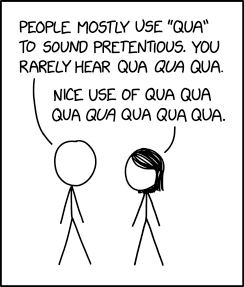Qua

Qua qua qua is the sine qua non of sine qua non qua sine qua non.

Qua qua qua is the sine qua non of sine qua non qua sine qua non.
Qua is a relatively rare, formal word, from Latin, roughly meaning "in the capacity of". For instance "In essence, military regimes are autocracies in which the military qua organization performs many of the functions performed by the ruling party in single-party regimes".
Saying something is "X qua X" (e.g. "entertainment qua entertainment") means when X is being viewed in its most typical capacity (eg, entertainment as something that entertains, rather than as a business, a form of propaganda, or whatever).
For example, "A copy, qua copy, can never be the equal of the exemplar, and it may be much its inferior." [1]
Cueball claims that people only use qua to "sound pretentious" without properly understanding its meaning. Thus, people do not use "qua qua qua", or "qua for the sake of qua". However, Megan one-ups this with a series of seven quas: she compliments Cueball's successful use of "qua qua qua qua qua qua qua", or "the phrase 'qua qua qua' for its correct meaning".
The joke is that, for the reader, the conversation has likely dissolved into gibberish because of unfamiliar terminology and semantic satiation. This is similar to other complex sentences such as "Buffalo buffalo Buffalo buffalo buffalo buffalo Buffalo buffalo", "That that is is that that is not is not is that it it is", and "James while John had had had had had had had had had had had a better effect on the teacher". Following this trend, you can create a grammatically correct sentence that includes 'qua' a consecutive number of times equal to (2n-1), where n is a natural number.
The title text goes further with this, using a Latin phrase sine qua non (meaning literally "without which not"), commonly rendered as "that which is absolutely necessary" or "essential". Thus, the title text says that "the word 'qua' in its real meaning is essential to the phrase 'sine qua non' used correctly".
However, the "qua" in "sine qua non" is a demonstrative pronoun ("which"), unlike the other "qua" which is an adverb, so the similarity is only coincidental.